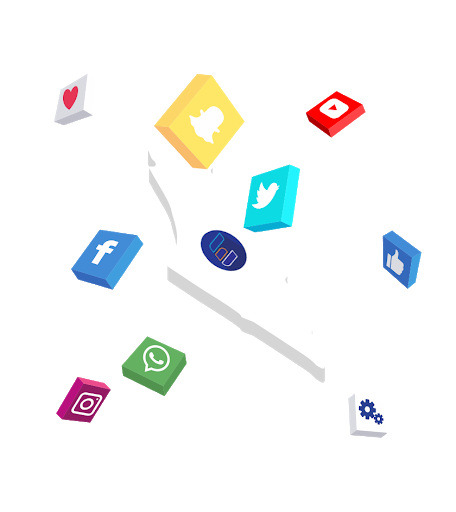Sada Social Center, which specializes in protecting Palestinian narratives on social media platforms, documented more than 770 violations of content during May, which is the highest percentage documented by the center in years, and it was noteworthy that these violations were distributed among the majority of global social media platforms.
Sada Social Center also launched legal action against Facebook in London in cooperation with Palestinian news networks, accounts, and an international law firm. Meanwhile, the center has sent a letter to the United Nations Special Rapporteur on Freedom of Expression about these violations.
The rate of violations against Palestinian content increased remarkably and escalated with the beginning of Sheikh Jarrah neighborhood uprising, events of occupied Jerusalem, and the Israeli attack on Gaza, with an unprecedented rise in the requests of the Israeli occupation to social media platforms to restrict Palestinian content.
Sada Social Center team documented more than 770 violations during May, as Facebook topped the list with 350 violations, followed by Twitter with 250 violations, Instagram with 100 violations, TikTok with 50 violations, WhatsApp 20, and 10 violations on YouTube.
These violations also varied between the complete ban and suspension of some features, the complete closure of accounts or pages, or the restriction of publications and lowering reach levels.
It was remarkable that Instagram application, during the top of international solidarity with the issue of expulsion of the Palestinian residents of Sheikh Jarrah neighborhood from their homes, restricted the account of Mona al-Kurd, a media activist and a resident of the neighborhood, as well as blocking and restricting access to the Al-Aqsa hashtag, which was one of the most popular during the escalation period in Al-Aqsa Mosque in the holy month of Ramadan.
In addition, the application deleted publications and stories, restricted accounts, and banned live broadcasts for a number of Palestinian journalists and activists, in conjunction with the intensity of publishing to follow up on-field events and the Israeli occupation’s assault on Jerusalem and Al-Aqsa Mosque and the aggression on Gaza.
As for YouTube, it restricted access to the live broadcast of Al-Jazeera during the Israeli aggression on the Gaza Strip, while it deleted various clips and media materials that were published on different Palestinian channels.
Besides, Turkish and Arab users documented that the automatic version of the language translation on YouTube translated the word (Palestinians) into (Terrorists) for a video from a Turkish media platform.
Twitter violations came in deletion of hundreds of Palestinian and Arab accounts after tweeting and posting solidarity content with ongoing Palestinian matters, and the most prominent of which was the limitation of hashtags and posts published about the Sheikh Jarrah neighborhood in Jerusalem, and others about the crimes of the occupation and the Palestinian narrative in Gaza.
Furthermore, Tik Tok application deleted many accounts of Palestinian and Arab journalists and media organizations, foremost of which are the accounts of the Quds Network and Safa Agency, just hours after the Israeli Minister of Justice, Benny Gates, met with the application’s administration staff.
The center denounced the social media’s neglect of Israeli settlers’ calls to burn children and rape Palestinian women, considering it a new conspiracy and a severe blow to Palestinian people.
In the context of protecting and promoting Palestinian content, the Center, along with some specialists in social media and modern media, launched the “Unified Room for Palestinian Digital Activities” initiative, to unify digital efforts in Palestine and direct these efforts and activities to effective and efficient mechanisms and ways to deal with current events on the Palestinian arena.
The Center contributed to the restoration of a number of Palestinian accounts on Facebook and Instagram, including the account of activist Mona al-Kurd on Instagram, and Azmi Bishara’s Facebook page.
The center also recovered more than 130 Twitter accounts that were suspended due to the recent events in Jerusalem and Gaza.
Within the framework of cooperation with official institutions, the Center met with the Ministry of Communications and Information Technology to follow up on the human rights complaint that the Center sent to Facebook about the arbitrary censorship of Palestinian digital content.
The center’s team also participated in dozens of press and media interviews, the most important of which were the Washington Post, TRT, Al-Mayadeen, Al-Araby, and Al-Jazeera Net.
The Center discussed with the Palestinian ambassador in London, Husam Zomlot, the message he received as an official apology from Facebook, WhatsApp, and Instagram, and a statement of good intentions to correct errors and respect Palestinian content and the right of expression through social networking sites.
The center also participated in the popular campaign of reducing the evaluation of Facebook application through the “Google Play” and “App Store”, which led to Facebook’s request from the “App Store” to remove the negative comments.
It is noteworthy that Sada Social Center is a voluntary youth initiative launched in 2017 to protect Palestinian digital content.



